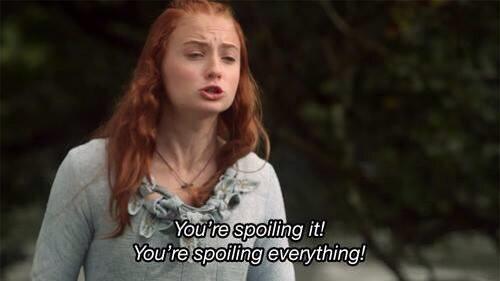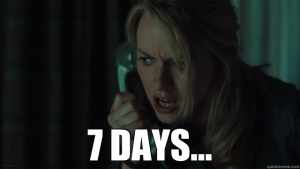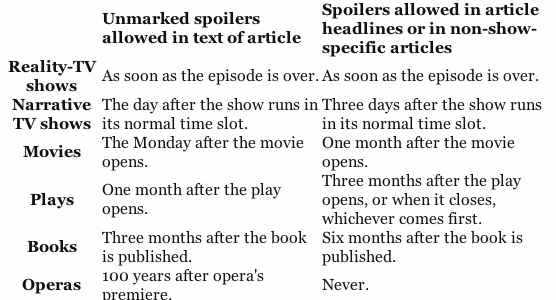Spoiler Alert! The Science of How Spoilers Can Ruin TV

You have probably been there.
Something kept you from watching last night’s shocking main character death on The Walking Dead or the two-hour season finale of Downton Abbey. Being the faithful viewer that you are, however, you recorded the episode on your DVR. Sitting at your desk and looking forward to watching it later, you log into Facebook to take stock of the day’s selfies, status updates, and food photos, and there it is: a major plot twist divulged right in the middle of your newsfeed.
SPOILER ALERT: This will likely happen to you again if you are one of the millions of people around the world who enjoy popular television.
The advent of social media, which gives people the ability to react to events instantly, and the development of technologies that are used to watch shows after they air, have made it easy to accidentally find out what happens in a TV show before watching it. Earlier this month, actor Michael Cudlitz posted a potential spoiler for the upcoming season of The Walking Dead, and last year, Mashable tweeted Game of Thrones spoilers out to their millions of followers shortly after an episode aired in the U.S.
Even offline, loyal viewers are poised to discuss plot twists immediately after they happen. Sex? Murder? Betrayal? We just can’t wait to weigh in!
But why are spoilers so frustrating? Why do we care about what happens on our favorite shows?
The answer to these questions may seem obvious, but Yale psychology professor Paul Bloom has extensively researched exactly what it is that spoilers spoil.
The Study: Demystifying Spoiler Science
Finding out why spoilers are so unfortunate starts with a fundamental question: Why do people enjoy stories in the first place?
“It’s puzzling that we spend more of our free time exploring fictional worlds—reading, watching TV and movies, playing video games—than engaging in real-world pastimes,” 1 writes Jennifer Richler of The Atlantic.
Paul Bloom and others argue that, to a degree, people do not distinguish between fact and fiction. This is backed by legitimate research.

For example, one study found that most people refuse to eat a piece of fudge molded to look like feces, even though they know that it is delicious chocolate fudge 2. The line is blurred between appearance and reality. We like watching sex scenes in shows because we like having sex, and watching betrayals play out on TV is just as exciting to us as juicy pieces of gossip in real life. Our minds conflate the two. Thalia Goldstein, psychology professor at Pace University, explains that this is because the conscious, thinking part of our brain tells us that a story is not real, while the more primitive part tells us that it is 3.
The science suggests one explanation for why spoilers can ruin our favorite TV shows:
“They remind us that a story is just a story. It’s hard to get transported when you already know where you’ll end up—in real life you don’t have that knowledge.” 4
Suspension of disbelief is truly what drives us to become invested in a show. When someone reveals that Rosa strikes Vee with a van as she drives off to escape Litchfield, before you have watched the season 2 finale, the strong, sassy women of Orange is the New Black dissolve into actors on a TV show.
Unwanted spoilers also take away some of the anticipation that comes with watching a new episode, which is important to how we enjoy the show. We keep watching our favorite shows to see how the plot moves forward. To a degree, taking away the anticipation that goes along with that spoils the experience.
Of course, not everyone hates spoilers. Spoiler apologists often cite a recent study, which found that people who heard the “spoiled” version of a short story enjoyed it more than those who heard the “unspoiled” version 5. This study overlooked a key fact, however. As Professor Goldstein pointed out, people are only bothered by spoilers for stories that they feel invested in, not those that they just heard about that day 6.
Still, for those few who do not mind spoilers, having the plot given away before watching the episode can heighten the experience. Some will agree that knowing the plot beforehand allows them to appreciate the details of an episode more fully. Others feel that reading spoilers before watching an episode takes away the anxiety of watching something suspenseful 7. Curiosity can be killer!
Unfortunately for the many viewers who do not possess that mindset, dodging spoilers online and offline is often necessary for the enjoyment of our favorite shows.
So, How Can We Avoid Spoilers?
If you are on a tight schedule and do not always get to watch your favorite shows as soon as they air, then you are probably wondering how you can save yourself from spoilers. Unfortunately, there is no sure-fire way to avoid them after an episode has aired, but a number of suggestions have been made.
Solution #1: A Seven Day Grace Period

“After [seven days], it’s open season,” Biddle writes. Anyone who wants to talk about details of the show is free to do so as much as they want.
This may seem like a perfect system, but it does not take into account those who are dying to talk about the episode immediately after it airs. It would also pose a problem for those living in countries like Australia, where ideas about television programming are notoriously outdated.
Solution #2: A Statute of Limitations System
Similarly, Vulture.com developed statutes of limitations on spoilers that is adjusted to reflect the nature of each outlet. 9

While some of these statutes are suggested jokingly, the chart provides a guideline that is particularly useful for those who write entertainment articles. Unfortunately, however, it possesses the same downsides as the suggestion made in solution #1.
Solution #3: Using Twivo

Two years ago, high school student Jennie Lamere invented Twivo, a program that allows Twitter users to censor their feeds from mentioning certain TV shows (and their characters) for a set period of time. Lamere won the grand prize at a national coding competition for her invention, which is available in the Google Chrome Web Store 10.
Users need only type in tags used by their favorite show and then hit “record” to block all tweets that include that phrase from view. Then, once they have watched the show, they can push “play” to make all previously hidden tweets visible again 11.
Unfortunately, nothing like this exists for Facebook yet, and you will still need to exercise care when discussing the show offline. But if you are an avid Twitter user, this app may help solve your spoiler problem.
Solution #4: Exercising Common Decency
Perhaps the vaguest, yet most obvious tip, comes from Fairfax‘s Emma Kemp. “Exercise conversational etiquette,” she writes, “ask the person you’re talking to how much of the show they’ve watched before you launch into your thoughts on episode four.” 12
While this solution should work like a charm, its tragic flaw is that it does not work on the web, and it does not take into account overeager friends who blurt spoilers out before you have gotten the chance to explain your predicament.
Solution #5: Staying Away from Potential Sources
Though not always 100% effective, perhaps the best way to avoid the ruination of a recent episode is to stay away from spoiler sources altogether. Stay off of Facebook and Twitter and avoid talking to friends offline about the show until you have caught up.
But for those who just can’t resist discussing their favorite shows, there’s always Reddit, which has a strict policy regarding spoilers (particularly on the Game of Thrones subreddit).
Similar to Twivo, Google has also patented an anti-spoiler system for social media earlier this year, which will likely be applied to Google+ in the near future. 13

The Bottom Line
Unwanted spoilers can shatter the carefully crafted illusion that writers, actors, and directors get paid the big bucks to create. If you subscribe to the spoilers-are-evil mindset, the only tried and true way to avoid them is simply to watch your beloved shows in real time.
Works Cited
- Jennifer Richler, “Scientific Explanations for Why Spoilers Are So Horrible.” The Atlantic, (2013). ↩
- Jennifer Richler, “Scientific Explanations for Why Spoilers Are So Horrible.” The Atlantic, (2013). ↩
- Jennifer Richler, “Scientific Explanations for Why Spoilers Are So Horrible.” The Atlantic, (2013). ↩
- Jennifer Richler, “Scientific Explanations for Why Spoilers Are So Horrible.” The Atlantic, (2013). ↩
- Jennifer Richler, “Scientific Explanations for Why Spoilers Are So Horrible.” The Atlantic, (2013). ↩
- Jennifer Richler, “Scientific Explanations for Why Spoilers Are So Horrible.” The Atlantic, (2013). ↩
- Jennifer Richler, “Scientific Explanations for Why Spoilers Are So Horrible.” The Atlantic, (2013). ↩
- Sam Biddle, “How to Stop Spoilers from Ruining TV for Everybody.” Gizmodo.com, (2012). ↩
- Dan Kois, “Spoilers: The Official Vulture Statutes of Limitations.” Vulture.com, (2008). ↩
- Dana Liebelson, “This 17-Year-Old Coder Is Saving Twitter From TV Spoilers (Spoiler: She’s a Girl).” MotherJones.com, (2013) ↩
- Jen Lamere, “Tivo for Twitter – prevent spoilers and save tweets for later.” Chrome.Google.com, (2013) ↩
- Katie Booth, “What Should We Do About TV Spoilers? And Why Do We Even Care?” Junkee.com, (2014). ↩
- Dave Gonzales, “Google just patented an anti-spoiler system for social media.” Geek.com, (2015) ↩
What do you think? Leave a comment.











Hmm. It’s interesting to see the science behind spoilers, and the way people feel about them. I can’t stand major spoilers for TV and movies, but I will read the last page of a book before buying. I think, in my case, it’s about the emotional tone of what I’m reading–if someone has already watched a show/movie, I can ask them non-spoiler type questions to see if I’ll enjoy watching. But then, I like fiction for the way it makes me feel, not the suspense.
I think it’s difficult to avoid spoilers without taking drastic measures, like avoiding social media and conversation with people who have seen the episode/film. Some of the suggestions are really good, and I’ve also seen people use SPOILER ALERT warnings. I’ve also seen spoilers where you have to highlight the text to read the spoiler. But something tells me those aren’t viable options across all social media platforms.
And, well. Wandering around with your hands over your ears going “LA, LA, LA, I’M NOT LISTENING” is a tad extreme.
Great article, Nicole. Spoilers are an interesting beast. With websites like Reddit, which encourage constant activity and engagement, it is hard to avoid them. While knowing of spoilers prior to an engagement with a text inevitably changes said engagement, I do not think it negates it. Of course, though, it is preferable to be unaware of spoilers.
I’ve visited three different subreddits of different fandoms and they all have strict spoiler policies. The subreddit of asoiaf knows more than I do and it’s very easy to navigate without getting spoiled.
I would suggest telling people you know not to spoil anything for you. If they do, it’s impolite and spiteful. That’s the best advice I can give in regards to society. As for the internet, just be cautious. Careful what you have as your homepage, if your series is on the headlines, ignore it. The title alone doesn’t usually spoil anything. The content does that. The biggest danger is Facebook. If anyone knows a way to prevent spoilers on that, you let me know 😀
For me, when someone reveals a major spoiler to a film or TV show, it surprisingly does not ruin the experience. Why I may know that a specific character dies, I don’t specifically know how they are going to get killed off, and I still get enjoyment from the show. Spoilers don’t really effect me in the long run.
If the tv/film/book is good enough, it hardly matters if you know what eventually happens because it’s the build up thats the key.
I don’t mind spoilers. Not at all.
I read the last chapter of the book first, make up my mind about viewing a show based on the recap. And like to know who dies in advance.
The enjoyment in reading/viewing is in the appreciation on how things are portrait not in not knowing what is going to happen next.
I can reread a good book or re watch a good show many times tough I know exactly what happens.
Spoilers should remain exclusively to articles/websites discussing the subject.
I don’t want to be reading an article about the top shows or films of all time and suddenly be spoiled about a film without warning.
Of course, there are some films and tv moments which are culturally huge and thus, you already know them even if you have zero interest in them (Sixth Sense, Star Wars, Usual Suspects, Titanic…)
I tend to watch box sets. I start off watching them without knowing what happens. Inevitably I’ll end up going online and reading plot summaries, thus spoiling it for myself.
As for Game of Thrones..the books have been out for near twenty years. I saw someone get snitty over The Hobbit being spoiled for them too recently. The Hobbit, the world famous book published near a century ago. I wouldn’t be surprised to hear someone get annoyed at having the end of Jesus of Nazareth spoiled for them next.
I always assumed a spoiler was information not easily available to everyone else, like the Sun’s recent shitty behaviour regarding the Doctor Who episode at Christmas.
If spoilers were really such a problem, why would the most successful film franchises be adaptations of novels where a large proportion of the audience know exactly what is going to happen?
The essence of ‘genre’ entertainment is that consumers know the rules and are primarily interested in how they are played out. They don’t want to be surprised, except in small ways.
Haven’t there been studies to show that audiences who have been told the plot actually report enjoying films more than those who haven’t?
Depends what the plot is and how twisty it’s twists are, with Ulysses at one end of the spectrum and The Murder of Roger Ackroyd at the other.
I know: JK Rowling completely spoiled the end of the movies by writing the books in advance. 🙂
Another thing that is irritating (and done quite regularly) is when we are told that a huge twist is coming up, even if we are not told what it is. Continuity announcers do this too. This has the effect of considerably lessening the impact of the twist when it happens, as we know something of that ilk is coming.
This really cheeses me off.
At the end of Breaking Bad, it turns out Walter’s been dreaming the whole thing since the beginning. He’s still teaching chemistry and he hasn’t went into the meth business.
Sorry to ruin it folks. But you shouldn’t have read the comments section of an article on TV spoilers, should you? Eh?
I think that spoiler etiquette is a two-way street. If it is a current show, and you know people will be talking about it, you should avoid social media until you’ve watched it, if you know that will be soon. Similar to if you miss a sporting event, and watch the game the next day.
Do not discuss a show with/in front of people if they haven’t already seen it and *might* be interested in it. And if you’re doing so as a recommendation, then do so tactfully without spoilers.
My first encounter with a spoiler was in the pub when a friend ruined the film The Sixth Sense for me. You all know what he said.
The Sixth Sense is an interesting case, because the spoiler for that is something like a running joke.
The spoiler for The Crying Game was once a running gag too. The closing credits of the movie Hot Shots Part Deux included a spoiler for The Crying Game.
I pi$$ed off a Star Trek fan last year when I inadvertently tweeted a spoiler about Khan in the latest film. Not knowing the mythology of the series, I had no idea that I had done so, until I got a battery of vicious tweets. This was more than a week after the film had opened.
The amount of times I’ve been planning to watch, say the Grand Prix highlights. And I’ve foolishly turned on the BBC Website and it’s emblazoned with “Vettel cruises to dominant GP Victory! (subheading: Alonso beats Webber to third place, Hamilton out, hours before the broadcast.
Give people a choice!
I watched all 6 seasons of Lost this year and deliberately resisted looking online for further reading until I’d seen them all. Where it falls down is social media and those impolite souls who don’t start their post with ****SPOILER ALERT***
P.S. If you’ve just read the last two words first, don’t worry, there aren’t any spoilers 😀
The only way to avoid spoilers totally would be to not write or talk about these shows.
Wonderfully written! It is also interesting to think about the dangers of spoilers when the show is still in production – otherwise known as news leaks. Case in point: actor Jason Statham (Crank, The Expendables) was recently being considered for the role of Bullseye in Season Two of Marvel’s Daredevil on Netflix. However, once the casting announcement was “spoiled” prematurely, fans were very excited. This excitement led to Statham’s agent asking for more money from Marvel. Due to this, negotiations broke down and Statham is no longer being considered for the part.
The science behind spoilers is quite neat. I, personally, hate spoilers when it comes to video games, but for TV I’m a bit more lenient with. Perhaps it is because I am more engaged in a video game than I am with a TV show.
It is hard to stay spoiler free in the internet age though.
I really enjoyed this article.
I live in Mexico, so every single show I see is a day (or more) behind everyone else, so everything is always “spoiled” for me, but I don’t care.
the only advice is dont read articles about spoilers. Nor attend ANY wedding EVER in Westeros.
Whoops.
I don’t like spoilers and do my utmost to avoid them. It’s hard when internet sites have spoilers as headlines though.
Yes, it’s the headline spoilers that are hard to avoid!
My friend spoiled The Purple Wedding for me. Unforgivable.
You can tell when you’re reading something that is about to contain a spoiler, and if you read on, even another sentence or paragraph, then you are really asking to be disappointed.
If you don’t want to have a show spoiled for you, then turn the page.
I remember starting a TV series with my friends and one of them watched some episodes ahead of time, and couldn’t help but talk about what was going to happen and when it would happen. It was a bit frustrating as we all agreed we’d watch it together, but it does ruin the anticipation of the show, and I’d rather react to the show’s portrayal of the story line as opposed to hearing my friend describe it.
I normally just avoid social media comments regarding shows I watch, and I happen to know who talks about what. For the most part, my friends are courteous about making sure they ask where I am in a series and only post generic things such as “Can’t believe the ending to ___ of (insert show name),” which is helpful in my case. Fascinating article, by the way!
I avoid reading blogs that directly follow a show if I’ve missed it for some reason or other.
On occasion there has been the odd remark made by someone who has obviously seen more of a show but generally I think most people are pretty respectful of not leaving anything to spoil the enjoyment of fans of a particular TV series.
This was an entertaining read, thanks. I appreciate the psychology cites and the charts of do’s and don’ts very imaginative piece.
I think I’d go insane if I have to hear another spoiler alert!!!!!!!!!!
It’s interesting to think about spoilers in terms of the level of engagement you have in the media in question, which is kind of a double-edged sword in itself. I find that the more engaged you are in a certain show, the more vulnerable you are to spoilers due to the potential volume of media/reactions to the latest episode/season-wide events you may encounter, while at the same those spoilers have a greater effect because of the degree you care for/enjoy the show in question. It’s also cool just in terms of fandom communities because, in the same way, a group that may enrich your experience if you’ve seen the latest episode may also be detrimental depending on how your viewing schedules line up and how much restraint the members of that community have.
I don’t watch many television series, but when it comes to manga, I like to read spoiler threads. It excites me to know what’s happening next and I like to read fan theories. When people are debating about the characters or the storyline, I feel as though everyone is immersed, which is why I don’t think spoilers are a bad thing.
Thanks for the article!
This was an awesome read! I loved the bit about the blurred lines between fiction and reality and how stories can influence daily experiences as much as, if not more, than our own experiences. Thanks for sharing!
Binge watching TV shows and having someone spoil it halfway through is probably one of the worst things. I loved reading this and thinking past just watching the shows.I love the science and psychology behind spoilers and even watching TV shows. Thank you for the article! (:
Spoilers suck! In every way, shape and form. However, I feel that if the TV show is really that great and you feel oh so passionate about it, hearing a spoiler shouldn’t make you not want to watch the show anymore. Yes, it ruins all the built up anticipation and excitement, but hearing about something and seeing it are two completely different things. Seeing the psychology behind spoilers was extraordinary and good knowledge to have. 🙂
I honestly sometimes like spoilers, but mostly I don’t. I like them in the sense that I can know what happens in a sports game. Being a major hockey fan but having a busy schedule I can’t watch the game all the time. But when it comes to tv shows I don’t like them at all. I like being in the moment of a tv show and not knowing what’s going to happen next. But when I hear a spoiler I’ll still watch the show, I’ll just be going into it knowing what happens. Which isn’t always fun.
I hate spoilers. Always. I have trouble even finishing a book for class if it’s been spoiled in advance. I like trying to guess what’s going to happen and not have it told to me. Even if someone figures out something on a show or movie seconds before me and says it out loud, I can’t stand it.
I’m not so sure about the part about considering it reality, but I guess it has some logic to it. It’s hard to say, since I don’t know of anyone who has ever voiced a conscious realization to that end. But hey, I haven’t done the research, so what do I know?
I love these ideas towards spoiler prevention. I have always hated spoilers but at the same time, would seek them out on occasion, because I couldn’t stand questioning anymore… after which I feel dirty… XD
This is a really interesting article as I never considered the science behind why people get so angry about spoilers. It was really cool to read about how our mind distorts fiction and reality and how we can’t always make out the difference between the two. As a person who survives off of spoilers, who reads the end of the book first, and Googles how an episode ends before watching it I rarely find myself becoming angry over spoilers in the media. However, I do understand how a spoiler can take the anticipation and excitement away from watching an episode of a show or a movie.
Great article! I loved the theory about why we hate spoilers
The theory behind why we hate spoilers was very interesting and thought provoking. I loved it!
When binge-watching a show on Netflix, I often read ahead through the episode descriptions. It is always a little disappointing when they reveal a spoiler. You think that would caution me from reading ahead, but alas!